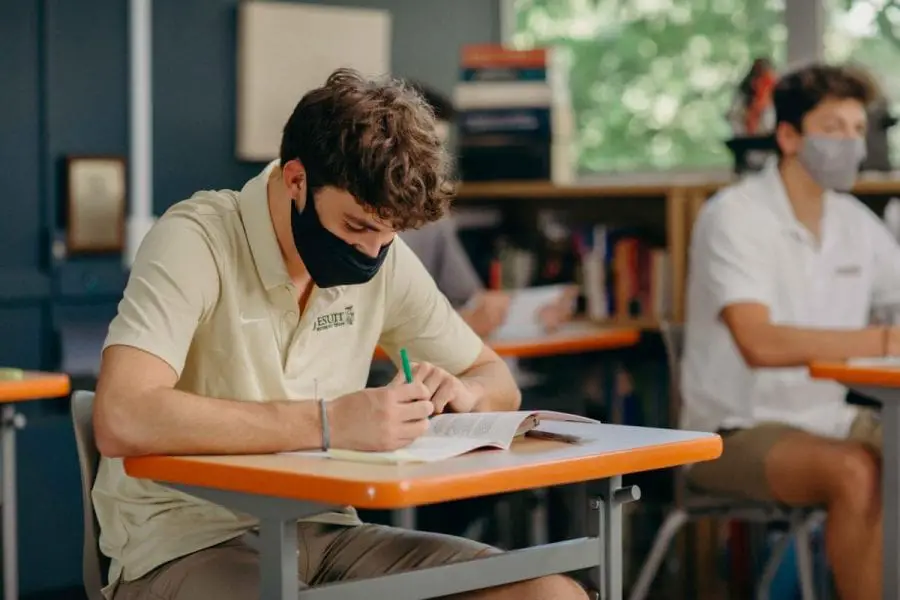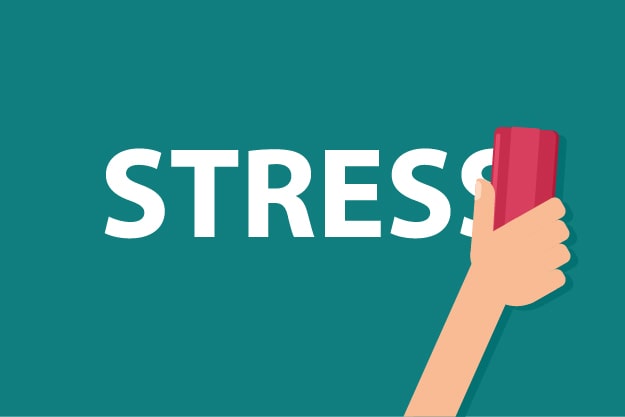It’s no secret that students are under a lot of pressure to get good grades. But what many people don’t realize is just how much pressure students are feeling.
According to a study by the American Psychological Association, 62% of students feel moderate to extreme stress because of school and college. It seems like typical school and college students have plenty of tasks to deal with.

Stanford lecturer Denise Clark Pope wrote a book about “Doing School: How We Are Creating a Generation of Stressed out. This book offers a tender and disturbing memory of a higher standard and an unequal society in our present-day high school students. She discovered everything about how students are manipulated in their school and college life.
Let’s discuss more why grades are not good for students.

- Extreme levels of stress can hinder work effectiveness and lead to poor academic performance and attrition
- Many of the emotional and physical symptoms that occur commonly in the college population, such as headaches, fatigue, depression, anxiety, and the inability to cope, can be attributed to or exacerbated by stress
- Negative physical effects of stress include immune system suppression, which can increase susceptibility to physical illness and psychological conditions such as anxiety and depression
- Students who engaged in meditation practices demonstrated significantly greater reductions in perceived stress than students who did not
- Students in secondary and postsecondary education settings encounter a variety of ongoing stressors that are related to academic expectations
What are the causes of pressure for good grades?

Critics refute the notion that possessing good grades may motivate students to work. Supporters assert that it is due to the effectiveness of such a system in transporting students’ efforts to accountability and encourages learners to contemplate their standing.

Causes of the pressure: Pressure is often put on students to succeed in school. This pressure can come from many sources. The main causes are given
- One reason is that parents may expect their children to get good grades in order to prove that they are smart or talented
- Some parents may put a lot of pressure on their children to succeed academically, which can lead to feelings of pressure and stress
- Some parents expect their children to get good grades in order to maintain or improve the family’s status
- Parents, teachers, and other adults often expect students to get straight A’s
- Pressure to get good grades is the fear of failure
- Students may be afraid that they will not be able to get into college or that they will not be able to find a good job if they do not have good grades
- Some students feel pressure to get good grades because they want to pleased their parents or teachers
- The causes of peer pressure include the need to fit in, low self-esteem, fear of rejection, and at most times the need to feel safety and security from peers

Effects of the pressure: As the amount of stress put on teenagers today between balancing their schedules, school, extracurricular activities, social obligations, decent sleep, and an active lifestyle is being considered a national health epidemic (Palmer, 2005), it’s regarded as a health epidemic. Students are forced to focus so much on earning grades that are expecting them to please their parents, and as a result, give up sleep and miss other aspects of life that are important for them, such as quality time with family and activities they like.
The mental as well as physical stress they endure from the demands of phonics lessons, parents, teachers, colleges, and peers have an extensive effect on each student, and some have a greater impact on others.
Teachers and parents are the main reason for students’ stress. Consider why the stress is evident, and key causal factors can be found.
- The pressure of society can be a heavy weight to shoulder
- The pressure to succeed can be overwhelming, leading to feelings of anxiety and depression.
- The pressure to conform can be too much, resulting in self-doubt and low self-esteem
- The pressure to fit in and be accepted can cause people to do things they normally wouldn’t do, such as changing their appearance or lifestyle.
- To cheat, they possibly turn to drugs, and relationships with fellow classmates may be affected negatively
- Kids will attempt to make the most of chances such as attending school based on how much they are pressured (their odds of doing so will increase)
- They may feel pressure, either from their family, their teachers, society, or themselves, to achieve higher grades and academic success
- Educational pressure has been shown to increase anxiety and stress in children, which may lead to poorer physical health
- Stress can undercut job efficiency, induce low academic performance, and lead to job attrition
- College students who experienced stressful life events also reported worse health outcomes and reduced quality of life
- Students’ concerns about doing well academically, as well as pressure that students and their parents and teachers put on themselves to perform excellently, may lead to emotional and physical health problems
- Student neglect on the negative effect of the pressure they are encounting because they want to maintain high grades
- Students have a few effects of pressure on students to get good grades such as extreme stress, cheating during exams and changing of the attitude.
- Many students may experience symptoms of anxiety and stress
- Pressure for good grades is a complex issue that has both positive and negative effects on students
Why are the High school students experience more stress?

High school can be a stressful time for students. To do their best to get them excellent straight As, take part in extracurricular pursuits, play sports, and acquire a perfect score on the ACT test, the rigors are plenty. Can such psychological stress lead to teen suicide? Taking this situation into consideration, students may be under super stress.
People say the junior year of high school is the most challenging because of the SAT test, increased amount of homework, a serious plan for post secondary school, school activities, and so forth. I am currently doing my BSc and I totally agree with them. From doing my homework, participating in after school activities, having a social life, and my family obligations at home — finding a balance between everything is not easy. Consequently, I am often stressed as I try to find ways to maintain everything while being under pressure from my parents, teachers, and peers.

- Fear of failure: Students who have had a tough time with school might come to high school with a history of setbacks. Past setbacks may make the demands of high school seem like even greater hurdles to overcome.
- Tougher academics and more responsibilities: The academic demands of high school progress as kids get older. While they may initially make great strides in middle school, they aren’t prepared for more-demanding academics as they move through high school. At the same time, they must assert themselves more if they want it, or have to challenge a parent or authority figure.
- Social pressures: Stress caused by social situations can also cause tension in teenagers. They’ll be under pressure to fit in, be popular, and have numerous friends regardless of whether any of these are actual friends. As they become more independent, teens may be faced with unseen and unexpected circumstances in which it’s best to make tough decisions.
- Uncertainty about the future: High school students must consider what kind of job they want to pursue, and they also have to decide which path school, work, and training at the newest facility may work best for them. Kids with IEPs will have to go through a formal process to come up with a transition plan. But predetermined options may not reduce the stress.
- Concerns about college: Schooling can be another source of stress for kids who have learning disabilities and learn differently than other children. But the process of getting into college has its own stressors also. These include standardized exams, filling out applications, and choosing a school.
What are the causes of academic pressure?

There are a lot of things that students have to worry about, like homework, tests, and projects. All of these things can be really stressful, especially if you’re trying to do well in school. Sometimes people feel a lot of pressure to get good grades, and that can be really tough.
There are a lot of reasons why someone might feel pressure to do well in school, like wanting to make their parents proud or wanting to get into a good college.
- One of the main sources of academic pressure is expectations from parents and teachers
- Students often feel like they need to live up to the high standards that their parents and teachers have for them
- This can be very stressful and lead to a lot of anxiety
- Another source of academic pressure is competition with other students
- Students often feel like they need to get good grades or outperform their classmates in order to be successful. This can cause a lot of stress and pressure to do well in school
- College-related factors contributing to student’s stress include, the transition from school to the college environment, the curriculum load, and summative assessments
- The reason is that they may not be used to having so much free time
- They may also not be good at estimating how long tasks will take to complete
- Lack of interest in the subject matter or course material
- Inability to keep up with current research and developments in their field
- Unrealistic expectations or demands from students
- Frustration with administrative duties or other non-teaching responsibilities
- Poor academic performance common causes include: lack of motivation, lack of focus, difficulty with the material, and poor study habits
- One major reason is that many students do not have enough time to eat properly and exercise
- Inadequate preparation and sleep can cause students to underperform in school
- Sleep deprivation has been linked with poorer academic performance, lower standardized test scores, and an increase in behavioral problems.
- A lack of preparation can lead to a feeling of anxiety and insecurity
- The most common sources of noise pollution in academic settings are people talking, phones ringing, and printers printing
- Other sources of noise include electronic devices such as laptops, tablets, and cellphones, as well as conversations between students and instructors
The last major cause of academic pressure is the need to earn good grades. Students often feel like they need straight A’s in order to be considered successful.
6 Effects of stress on students:

There are many reasons for and effects of stress on students. Some of the causes might be academic difficulty, family issues, financial concerns, and health concerns. The effects that stress may have are physical, emotional, or behavioral.
Physical symptoms may comprise headaches, stomachaches, dizziness, and chest pain. Emotional signs may include being frightened, stressed, upset, or livid. Behavioral indicators may include overlooking work, have negative emotions, or behave rudely.
Effects of Stress

After you encounter stress, certain hormones (chemicals) in your body are released. These hormones possess various impacts on the relevant bodily systems. As an example, after release of these hormones, your vascular system expands, your heart motions faster, your adrenaline and cortisol levels surge, and your attention and breathing grow more alert.
Here are the 6 effects of stress on students:
- Blood pressure may rise
- Heart may pound
- Muscles may tighten
- Stomach may become tense
- Concentration may get worse
- Forgetfulness may get worse
Stress will produce long-term effects

If you feel stressed, it’s crucial for you to manage your stress. Stress can take a toll on your health. Over time, you may develop indications of stress:
- Physical: Frequent colds or the flu, headaches, trouble sleeping, muscle tension, skin problems, difficulty with digestion are all symptoms of a neuromuscular disorder.
- Mental: Negligible focus, forgetfulness, learning disabilities, negative thoughts, and poor oral communication are a few examples of symptoms that can occur when concentration is weak.
- Emotional: Anxiety, depression, anger, irritability, feelings of helplessness, lack of purpose, relationship problems radiocarbon dating appendix of radiocarbon dating In this article, your author offers a simplified, rapid overview, with pointers for further study, of the dating technique known as radiocarbon dating.
- Behavioral: Significantly consuming food when unhealthily, driving irresponsibly, using alcohol or drugs irresponsibly, being prone to accidents, and showing aggression may indicate impaired thinking .
What are the causes of stress among teenagers?

Teens, like adults, may experience stress every day and can seek techniques to deal with stress. Most teens are stressed more when they perceive an issue as dangerous, difficult, or painful, and they may not even be able to cope with it. Stress can be caused by many factors among teenagers, such as fear of parents, school, or tests, so learn stress management techniques:
- Frustrations and demands of a school are to blame for this idiom
- Puffy blemishes or bad feelings about themselves
- Changes in their bodies
- Problems with friends and/or peers at school
- Unsafe living environment/neighborhood
- Separation or divorce of parents
- Chronic illness or severe problems in the family
- Death of a loved one
- Moving or changing schools
- Putting too much emphasis on your number of carried out tasks or having too high of a standard for your accomplishments is a persistent theme.
- Family financial problems
What are the pressures of being a student?

A student’s life is full of pressures. There are many expectations that come with being a student. One of the most common pressures students face is the pressure to succeed academically. Students feel pressure to get good grades, to do well on tests, and to meet the academic standards of their school or program. They may also feel pressure to participate in extracurricular activities and to have a perfect social life. Additionally, students often feel pressure to juggle all of these responsibilities while maintaining a healthy lifestyle. This can be difficult and can lead to stress and anxiety. It is important for students to manage their time wisely and learn how to deal with stress in healthy ways.

High school can be a difficult time for students. They are trying to figure out who they are and where they fit in, all while juggling academics, social life, and extracurricular activities. Here are some of the pressures that students face during high school:
- They feel pressure to get good grades and to please their parents and teachers
- They feel pressure to fit in with their peers and to have a social life
- They feel pressure to participate in extracurricular activities and to be involved in the community
- They feel pressure to make decisions about their future, such as what college they want to attend and what career they want to pursue
- They feel pressure to deal with problems such as bullying, drugs, and alcohol abuse
How can a student handle these stress problems?

Stress is a serious difficulty for students. Too much stress can potentially have adverse results in the classroom, on your relationships, and even your health. There are several approaches for students to get rid of stress. Some easy ways include adjusting your sleeping patterns, exercising, and spending time engaging with friends or family. Other things that are a product for some individuals include meditation, Yoga, and cognitive behavioral therapy.
Students present stress management problems to students:

- Get Enough Sleep: Students, with their packed schedules, are notorious for missing sleep. Unfortunately, operating in a sleep-deprived state puts you at a distinct disadvantage. You’re less productive, you may find it more difficult to learn, and you may even be a hazard behind the wheel. Don’t neglect your sleep schedule. Aim to get at least 8 hours a night and take power naps when you need them.
- Practice Visualization: Using visualization to relieve stress is simple and straightforward. Visual representations can provide you with the ability to unwind, dissociate yourself from what’s stressing you, and turn off your body’s fight or flight response. You can also use visualizations to prepare for presentations and achieve better scores on tests by vividly picturing yourself doing what you want.
- Exercise Regularly: Getting regular exercise is one of the most effective ways to simply forget about your problems and get your blood moving. By doing yoga in the morning, walking to the campus, or exercising with your friend while reviewing for tests on a treadmill at the gym, it is possible to exercise into your school day. Begin a workout schedule of your choice and keep it up throughout your entire life in order to stay healthier.
- Take Calming Breaths: When your body is experiencing a stress response, you are not always thinking clearly. A quick strategy to assist you in calming down is to practice breathing exercises. These can be implemented virtually anywhere to relieve stress in minutes, especially effective for lessening anxiety before or possibly during a test, as well as during other times when tension feels overwhelming.
- Practice Progressive Muscle Relaxation (PMR):A good technique to help combat stress is to slowly tense and relax all muscles. Progressive muscle relaxation (PMR) is a fantastic example of this type of technique. Practice can strengthen your body’s abilities to release stress on a moment’s notice, which can be used to aid relaxation activities before sleep or provide deeper sleep after monitoring stress levels. Students typically run this function before tests to reduce potential fear and panic.
- Listen to Music: Music has been proven to be one of the most prominent psychological stress relievers. Music can help calm yourself or heighten your mind, depending on the context you’re in. You can use classical music while studying, play upbeat songs in the morning to stimulate your mind, or listen to music with a gentle tempo to wind down at the end of the day.
- Get Organized: Clutter can hamper productivity, make you stressed, and cause you to spend a lot of money. Millions of students live in clutter-ridden homes, which can make it challenging for them to focus on their schoolwork and do well. One way to minimize the amount of stress you experience is to maintain a clutter-free, relaxing study area, without distractions. This can facilitate the retrieval of lost items, lower stress levels, save time, and help roommates have a more constructive relationship. It helps students have a more favorable, positive attitude toward their study area, which subsequently aids with homework and ensures more studying. Though it’s not a simple process, it’s well worth the effort.
- Eat a Healthy Diet: You may not realize it, but your diet can either enhance your brain function or adversely impact it. A healthy all-natural diet can act as a good health concentrate and a therapeutic tool. Improving your diet plan can help you get away from diet-related mood alterations, lightheadedness, and more.
- Try Self-Hypnosis: The student will likely say they are getting “very sleepy,” but this can have serious implications on his stress levels and his productivity. Self-hypnosis may be a suitable stress-coping mechanism and a helpful productivity booster. Help yourself release tension from your body and mind, and plant the seeds of success in your subconscious mind with the help of the enjoyable task of autosuggestion.
- Use Positive Thinking and Affirmations: Optimists actually do take note when more favorable circumstances are at their side, due to their optimistic attitude. It’s not a coincidence! You don’t have to be an optimist yourself, but the positivity that is available to you can help you make healthier living choices. Your relationships can also benefit. And no matter what you do or accomplish, your academic performance can be enhanced. Learn how to train your mind for more positive self-talk and better days ahead by expressing encouragement through affirmations and other tools for optimism. You can learn the strangleholds affirmations have on optimism and knowing the limitations of positive thinking.
Solutions

Preventing these shootings cannot be accomplished with one effort, assuming we want true progress. However, if we’re to be successful, parents will need to support their children with more support, society needs to rethink the way it views mental health, and students require access to more resources.
Society is currently struggling as a result of the growing tendency to rely on violence to impulsively handle problems. This challenge is not just with the schools or colleges either; it starts in the home. All too often, parents are not as involved with their children as they would like to think they are, as well as failing to take the time to listen to and communicate with them. They need to take greater roles in their children’s lives and build a stronger bond between them.
Society is also susceptible to this catastrophe. As part of our treatment for those with psychological sickness, we need to do a better job recognizing those problems and assisting those in need.
Conclusion
Many students feel this way. The pressure to get good grades can come from many places, including parents, teachers, and classmates. Some students feel that they need to have good grades in order to get into college or to get a job. Others feel that they need good grades in order to please their parents or teachers. And still others feel that they need good grades in order to keep up with their classmates. The pressure to get good grades can be stressful and can cause students to feel anxious or depressed. Some students even develop eating disorders or problems with alcohol or drugs as a way of coping with the pressure. If you are feeling overwhelmed by the pressure to get good grades, it is important to talk to someone about it.



